Rep. Robert Aderholt secures Space Command spending language in House appropriations bill

On Tuesday, Congressman Robert Aderholt (R-AL04) announced that he has been able to secure language halting the development of the U.S. Space Command (SPACECOM) in Colorado until an official basing decision has been made. “Now more than ever, the establishment of a permanent Space Command Headquarters remains vital to our national security,” said Rep. Aderholt. “The language incentivizes the Secretary of the Air Force to determine the permanent headquarters location as quickly as possible.” “In this matter, timeliness remains of the utmost importance,” Aderholt continued. “I urge the Department to move the headquarters to its preferred permanent location as quickly as possible; however, if the Administration continues to delay, I am relieved that General (James H.) Dickinson, the SPACECOM Commander, last week assured the Alabama Delegation that he had no national security concerns about moving the headquarters.” The bipartisan language is included in the House Appropriations Subcommittee on Military Construction and Veterans Affairs fiscal year 2024 spending bill, following a review and approval by the United States Air Force. During the Trump administration, the Air Force held a national search for a permanent home for Space Command. Dozens of sites across the country were considered for a multitude of factors. Two different evaluations found that Redstone Arsenal in Huntsville was the best possible site. Nebraska came in second, followed by San Antonio, Texas. Colorado, where Space Command is presently, came in fourth. A review by the inspector general found that the decision to locate SPACECOM in Huntsville was the correct decision and was not tainted by politics. “The fact is, Air Force already made the correct decision well over two years ago,” said Congressman Mike Rogers (R-AL03). That decision was affirmed by the GAO and the DoD Inspector General over a year ago. This decision was based on multiple factors, and Redstone Arsenal in Huntsville, Alabama, was the clear winner in the Evaluation and Selection phase. I am deeply concerned that the continued delays in making this move final are politically motivated and damaging to our national security.” Over 24 months later, no action has been taken to relocate SPACECOM. A recent report by NBC News claims that the White House may halt plans to move Space Command. The report cites Alabama’s restrictive abortion law. Alabama’s congressional delegation, however, points to the fact that Colorado voted for President Joe Biden while Alabama voted to keep President Donald Trump. The SPACECOM basing decision remains a responsibility of the Secretary of the Air Force, Frank Kendall, a decision delegated by the President of the United States and the Secretary of Defense. “As we take this step, I would like to thank the Alabama delegation for their commitment to this fight,” said Aderholt. “We all know that Space Command belongs in the Rocket City.” According to a June 2022 Government Accountability Office (GAO) report, the decision-making process that the Air Force used to decide to move Space Command headquarters from Colorado Springs to Alabama had “significant shortfalls in its transparency and credibility.” “Over the past year, we’ve repeatedly raised concerns that the previous administration used a flawed, untested, and inconsistent process to select a location for U.S. Space Command. The reports from the Government Accountability Office and the Department of Defense Inspector General both confirm that the basing process lacked integrity and neglected key national security considerations,” Sens. Michael Bennet and John Hickenlooper and Reps. Doug Lamborn and Jason Crow said in a joint statement. Additionally, legislators from Colorado argue that the decision to move Space Command was politically motivated, arguing that former President Trump indicated that he would decide the 2020 election. AL.com reported in 2021 that during an interview on the Rick & Bubba show, Trump stated, “Space force – I sent to Alabama. I hope you know that. (They) said they were looking for a home, and I single-handedly said, ‘Let’s go to Alabama.’ They wanted it. I said let’s go to Alabama. I love Alabama.” Robert Aderholt is in his 14th term representing Alabama’s Fourth Congressional District. He is an attorney and was formerly counsel for Alabama Governor Fob James. He is a native of Haleyville. To connect with the author of this story or to comment, email brandonmreporter@gmail.com.
Democrats’ letter urges amendment to National Defense Authorization Act

Vetting human rights security cooperation programs is the focus of a letter sent to the House and Senate Armed Services Committees by a pair of Democrats. California Congresswoman Sara Jacobs, Maryland Senator Chris Van Hollen, and 13 other federal legislators are urging the committees to include their amendment that would require vetting of human rights in cooperation programs within the fiscal year 2023 National Defense Authorization Act conference pact. According to the letter sent to Chairman Jack Reed, D-RI; Chairman Adam Smith, D-WA; Ranking Member Jim Inhofe, R-OK; and Ranking Member Mike Rogers, R-AL, members are pushing for House-ratified provisions of the Upholding Human Rights Abroad Act that would, if enacted, close loopholes in the Leahy Laws that would “guarantee human rights vetting” of U.S. security assistance that would prevent taxpayer funds from aiding human rights abusers. “This provision would strengthen the U.S. commitment to human rights by increasing vetting measures to ensure that recipients of U.S. support have not committed human rights violations or violations of international humanitarian law,” the members wrote in the letter. “Consistent with the Department of Defense Leahy Law, this provision allows for the use of a national security waiver.” The members wrote that the provisions would give the flexibility that would “continue to address U.S. national security priorities” that would allow the State Department to “undertake this additional vetting.” “This provision would help prevent civilian harm, ensure partner compliance with human rights, and improve intended long-term outcomes toward good governance, rule of law, peace, and human rights promotion,” the members wrote. The letter was also signed by Senators Dick Durbin, D-Ill; Patrick Leahy, D-VT; and Richard Blumenthal, D-CT; and Representatives Jason Crow, D-CO; Chrissy Houlahan, D-PA; Tom Malinowski, D-NJ; Joaquin Castro, D-TX; Albio Sires, D-NJ; Dina Titus, D-NV; Ted Lieu, D-CA; Colin Allred, D-TX-32; Gerry Connolly, D-VA; and Dean Phillips, D-MN. Republished with the permission of The Center Square.
Donald Trump impeached after Capitol riot in historic second charge

President Donald Trump was impeached by the U.S. House for a historic second time Wednesday, charged with “incitement of insurrection” over the deadly mob siege of the Capitol in a swift and stunning collapse of his final days in office. With the Capitol secured by armed National Guard troops inside and out, the House voted 232-197 to impeach Trump. The proceedings moved at lightning speed, with lawmakers voting just one week after violent pro-Trump loyalists stormed the U.S. Capitol after the president’s calls for them to “fight like hell” against the election results. Ten Republicans fled Trump, joining Democrats who said he needed to be held accountable and warned ominously of a “clear and present danger” if Congress should leave him unchecked before Democrat Joe Biden’s inauguration Jan. 20. Trump is the only U.S. president to be twice impeached. It was the most bipartisan presidential impeachment in modern times, more so than against Bill Clinton in 1998. The Capitol insurrection stunned and angered lawmakers, who were sent scrambling for safety as the mob descended, and it revealed the fragility of the nation’s history of peaceful transfers of power. The riot also forced a reckoning among some Republicans, who have stood by Trump throughout his presidency and largely allowed him to spread false attacks against the integrity of the 2020 election. House Speaker Nancy Pelosi invoked Abraham Lincoln and the Bible, imploring lawmakers to uphold their oath to defend the Constitution from all enemies, foreign “and domestic.” She said of Trump: “He must go, he is a clear and present danger to the nation that we all love.” Holed up at the White House, watching the proceedings on TV, Trump took no responsibility for the bloody riot seen around the world, but issued a statement urging “NO violence, NO lawbreaking and NO vandalism of any kind” to disrupt Biden’s ascension to the White House. In the face of the accusations against him and with the FBI warning of more violence, Trump said, “That is not what I stand for, and it is not what America stands for. I call on ALL Americans to help ease tensions and calm tempers.” Trump was first impeached by the House in 2019 over his dealings with Ukraine, but the Senate voted in 2020 acquit. He is the first to be impeached twice. None has been convicted by the Senate, but Republicans said Wednesday that could change in the rapidly shifting political environment as officeholders, donors, big business and others peel away from the defeated president. The soonest Republican Senate leader Mitch McConnell would start an impeachment trial is next Tuesday, the day before Trump is already set to leave the White House, McConnell’s office said. The legislation is also intended to prevent Trump from ever running again. McConnell believes Trump committed impeachable offenses and considers the Democrats’ impeachment drive an opportunity to reduce the divisive, chaotic president’s hold on the GOP, a Republican strategist told The Associated Press on Wednesday. McConnell told major donors over the weekend that he was through with Trump, said the strategist, who demanded anonymity to describe McConnell’s conversations. In a note to colleagues Wednesday, McConnell said he had “not made a final decision on how I will vote.” Unlike his first time, Trump faces this impeachment as a weakened leader, having lost his own reelection as well as the Senate Republican majority. Even Trump ally Kevin McCarthy, the House Republican leader, shifted his position and said Wednesday the president bears responsibility for the horrifying day at the Capitol. In making a case for the “high crimes and misdemeanors” demanded in the Constitution, the four-page impeachment resolution approved Wednesday relies on Trump’s own incendiary rhetoric and the falsehoods he spread about Biden’s election victory, including at a rally near the White House on the day of the Jan. 6 attack on the Capitol. A Capitol Police officer died from injuries suffered in the riot, and police shot and killed a woman during the siege. Three other people died in what authorities said were medical emergencies. The riot delayed the tally of Electoral College votes which was the last step in finalizing Biden’s victory. Ten Republican lawmakers, including third-ranking House GOP leader Liz Cheney of Wyoming, voted to impeach Trump, cleaving the Republican leadership, and the party itself. Cheney, whose father is the former Republican vice president, said of Trump’s actions summoning the mob that “there has never been a greater betrayal by a President” of his office. Trump was said to be livid with perceived disloyalty from McConnell and Cheney. With the team around Trump hollowed out and his Twitter account silenced by the social media company, the president was deeply frustrated that he could not hit back, according to White House officials and Republicans close to the West Wing who weren’t authorized to speak publicly about private conversations. From the White House, Trump leaned on Sen. Lindsey Graham of South Carolina to push Republican senators to resist, while chief of staff Mark Meadows called some of his former colleagues on Capitol Hill. The president’s sturdy popularity with the GOP lawmakers’ constituents still had some sway, and most House Republicans voted not to impeach. Security was exceptionally tight at the Capitol, with tall fences around the complex. Metal-detector screenings were required for lawmakers entering the House chamber, where a week earlier lawmakers huddled inside as police, guns drawn, barricade the door from rioters. “We are debating this historic measure at a crime scene,” said Rep. Jim McGovern, D-Mass. During the debate, some Republicans repeated the falsehoods spread by Trump about the election and argued that the president has been treated unfairly by Democrats from the day he took office. Other Republicans argued the impeachment was a rushed sham and complained about a double standard applied to his supporters but not to the liberal left. Some simply appealed for the nation to move on. Rep. Tom McClintock of California said, “Every movement has a lunatic fringe.” Yet Democratic Rep. Jason Crow, D-Colo. and others recounted the harrowing
Donald Trump trial closing arguments aim at voters, history
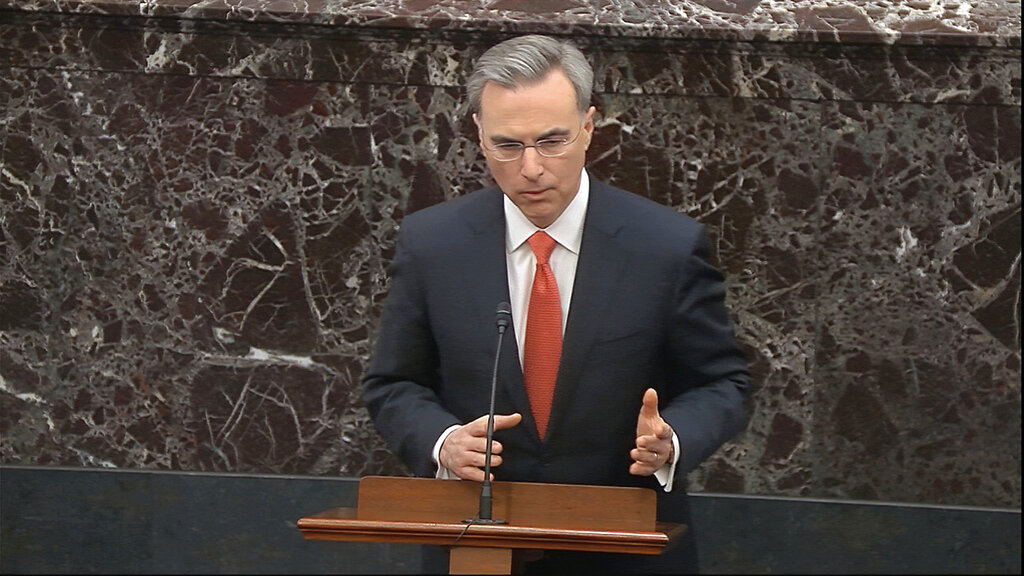
Key Republicans have decided the president’s actions toward Ukraine do not rise to the level of impeachable offense.
Donald Trump acquittal now likely Wednesday; Senate nixes witnesses

The delay in timing showed the weight of a historic vote bearing down on senators
24 hours in, senators flout quaint impeachment rules

Some openly snickered when lead prosecutor Adam Schiff said he’d only speak for 10 minutes.
Senate rejects witnesses in impeachment trial rules

“We have a great case,” Donald Trump said of the ongoing trial.
Buckle up: What to watch as impeachment trial takes off

Despite hopes for a speedy trial, things could last longer depending on Senate moderates.
Donald Trump defenders push ‘no crime’ as Democrats seek removal
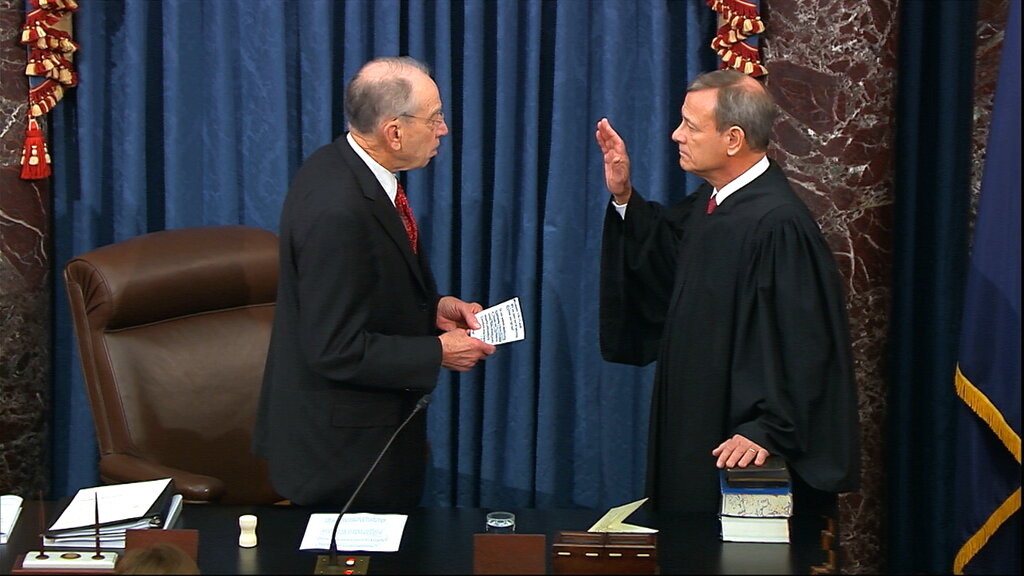
This approach stems from a letter written in 1868.
Donald Trump’s impeachment trial begins, senators vow ‘impartial justice’
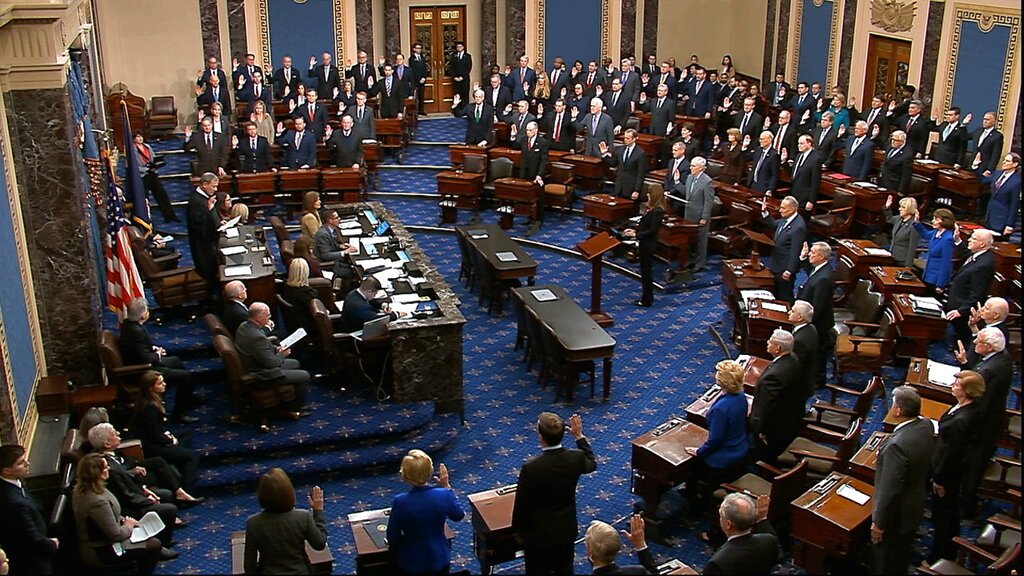
Senators said later that when Roberts appeared the solemnity of the occasion took hold.
Senate takes over Donald Trump’s impeachment after House handoff
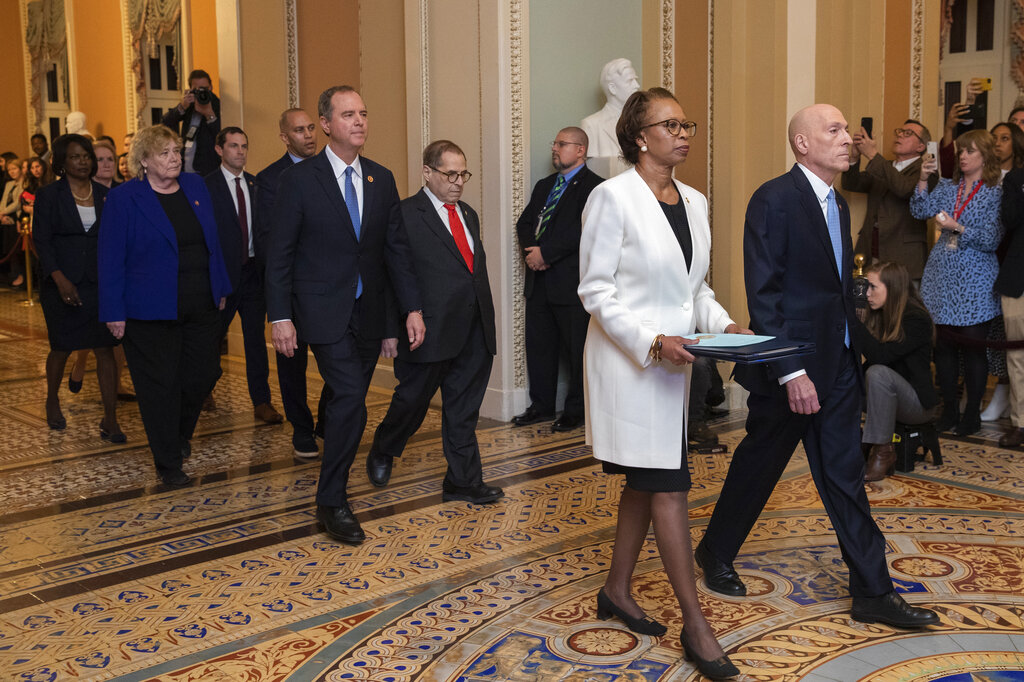
The team of impeachment managers escorted the document to the Senate in a dramatic procession.
House votes to send Donald Trump’s impeachment to Senate for trial
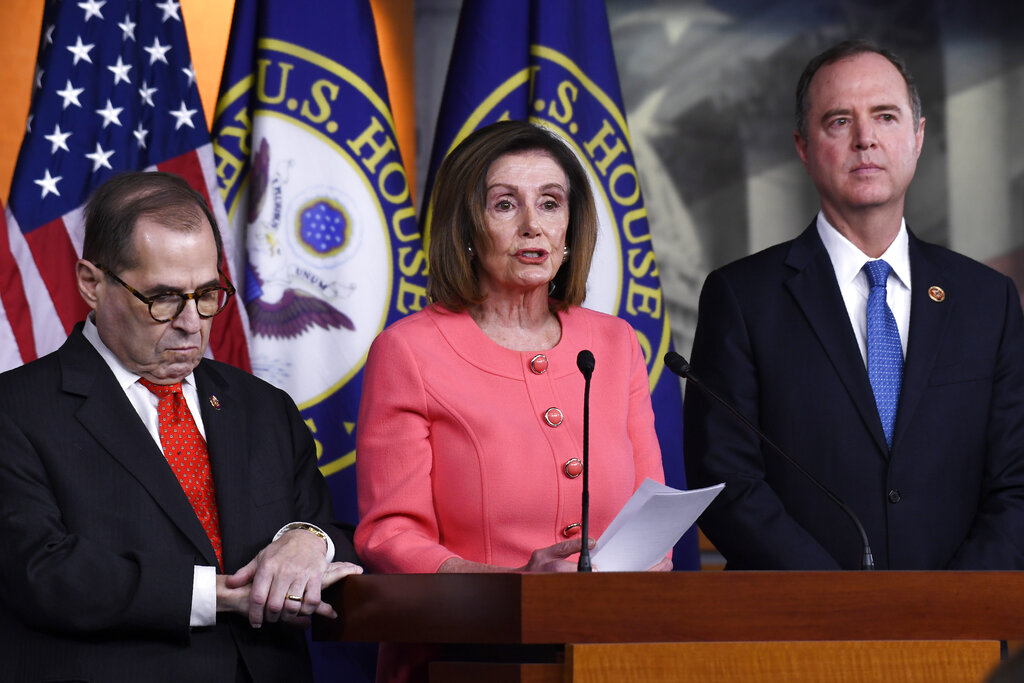
Nancy Pelosi also named impeachment prosecutors for the trial.


